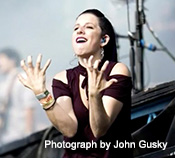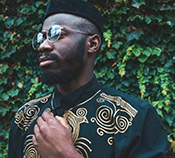Music Has the Power to Drive the World.
(Part 2)
Masashi Mori / Planner and producer of music festivals and live events
I Won’t Let Music be Neglected, Come What May.
Music festivals have been steadily gaining in popularity in Japan over the last 20 years. Masashi Mori has helped to drive the trend for 16 of those years as a planner and producer of music festivals. What drew him into the festival business? Masashi looks back at the defining experience that awakened him to the power of music.
My Fuji Rock Festival experience at age nineteen
The Fuji Rock Festival 1998 was my first taste of an outdoor music festival. Though only in its second year running, the festival became a big part of my life. For an avid fan of Western rock like me, Fuji Rock was the only place to be. Big name rock stars we saw on TV or read about in magazines took the stage in real life to mesmerize us with their magic, one after the other. And the audience was hugely diverse. People from all walks of life rubbed shoulders–students in school uniforms, rockers in leather jackets, longhairs in hippy garb. Thousands of total strangers were bonded together by the music.
Fuji Rock was so inspiring, I spent most of my remaining student years temping at music festivals. My life revolved around organizing festivals ever since. In the very first Rock In Japan Festival, I pitched in as a ground staffer. I directed the flow of people, or minded the audience at the front to keep them from diving toward the stage. After university, I took my first full-time job in an event production department at a consultant firm. Then I moved to rockin’on Inc., the event company that organized the Rock In Japan Festival. After two years of working on Rock In Japan, I moved to another event production company called Oorong-Sha. For the next seven years I worked with them producing the ap bank fes.

Music festivals can widen your musical horizons.
Takeshi Kobayashi at Oorong-Sha was a great inspiration for me. I learned so much from Takeshi during my days at the company. He spoke his mind to others and expected the same from them, whether he was dealing with an executive director or a junior member on his team. A meeting with Takeshi was like a jam session. He was open to any idea from any person, and always knew when an idea was good. If ever I doubted his opinion, I was supposed to tell him, which I actually did on a number of occasions. No one has been a bigger role model for me. He taught me the importance of pursuing what really mattered, of being accountable, of always having the courage to voice my opinions. These principles of conduct carry me forward in my career today, together with the various abilities I have gained along the way, like the logical thinking and structural communication skills I learned in my first job at the consultant firm.
My years of work in this industry have shown me how music festivals can bring unexpected discoveries and broaden a person’s musical horizons. A solo concert may be wonderful and inspiring, but it seldom offers something new or surprising. A musical festival is full of surprises: it exposes you to new artists and their messages and the concepts and values of the event may change your perspective. When I organize a music festival, I want the audiences to appreciate those discoveries as much as the music of their favorite bands.

Music shows us the way to go.
The year 2020 has turned out to be a difficult time for everyone. Many music events have been cancelled to limit the spread of COVID-19. Now that physical gatherings are discouraged, the online channel for music distribution has grown. This trend gives many musicians the opportunity to expand their fan bases. With virtual platforms, they can reach out to people who have never been to live events, or to people who have little time for entertainment, like the parents of young children. You can join a Zoom party remotely to share the experience of a live performance and communicate with others in real time. Virtual concert-going is moving into the mainstream as a new form of music culture. While virtual concerts can never match the physical energy of a “real” music festival, the possibilities they open up are intriguing. I look forward to the day when we beat the pandemic and people can safely gather at live venues. When that day comes, music festivals will blossom both virtually and in the flesh.
No matter what the future has in store, music will never be neglected. Music and art have the power to drive the world and point us in the right direction. As the pandemic forces us into a ‘new normal,’ we can safeguard the human tradition of social gathering by fighting to keep festivals and concerts alive. My contribution will be to produce socially relevant music festivals, together with musicians and other artists, to share messages that bring us together and inspire.

- Masashi Mori / Planner and producer of music festivals and live events
- In his early career, The Forest CEO Masashi Mori took a position in rockin’on, a renowned event production company responsible for major music festivals such as the Rock In Japan Festival and Countdown Japan. He later started working for Takeshi Kobayashi as chief production manager for the ap bank fes at Oorong-Sha, an event production firm that represents prominent artists such as Mr. Children. Now at his own company, The Forest, Mori produces large-scale events such as Kishidan Banpaku and the Hibiya Music Festival, along with solo stages for artists such as Superfly.
Interview Date:



